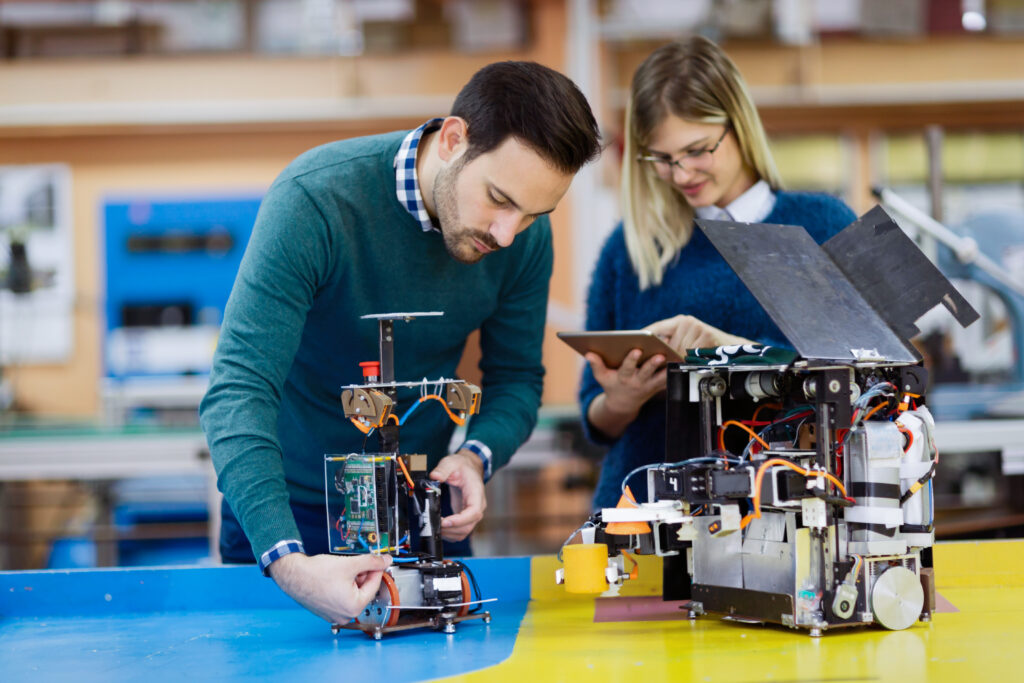Engineering is a dynamic career, blending creativity with science and cutting-edge technology. If you have a passion for design, problem-solving and forward-thinking, a future in engineering could be a great fit for you.
Check out our guide to studying engineering in Australia, with insights from current student Harishanth Nithyananthan. Originally from Sri Lanka, Harishanth is completing a Bachelor of Engineering (Mechatronics and Robotics Engineering) at Western Sydney University.
What are the different types of engineers?
Civil engineer
Civil engineers design and maintain the structures of modern society. From roads to bridges, airports, harbours and water supply, you can have a big impact on the infrastructure of the future as a civil engineer.
Electrical engineer
In simple terms, electrical engineers look after electrical equipment. From design to manufacturing, you can work on projects involving electrical motors in planes and automobiles, navigation systems, communication systems and power generation equipment.
Environmental engineer
Environmental engineers use engineering, biological and chemistry concepts to provide solutions for climate and environmental challenges. You can also choose specific focus areas, like biodiversity, pollution, public health and water access.
Mechanical engineer
Mechanical engineers are focused on power-producing machines, such as internal-combustion engines, refrigeration and cooling systems. Mechanical engineering has an extremely wide scope and can lead to work with medical technology to be used in surgery settings or even robotics.
Mechatronics and robotics engineering
This specialisation is the meeting point of mechanical and electrical engineering. Mechatronics and robotics engineers focus on the design, testing and development of smart machines (machines that don’t require human intervention to function).
Software engineer
Combining engineering and computer science, software engineers focus on problem-solving to provide new and updated computer technology for security and development for companies or day-to-day users.
How do you become an engineer in Australia?
The first step to becoming an engineer is enrolling in a bachelor’s degree in engineering at an accredited Australian institution. Many universities across Australia offer a variety of specialised degree courses, so you can refine your area of expertise.
Gaining a bachelor’s degree will qualify you for an engineering licence. You can apply for this licence through the National Engineering Register. A licence means you are capable of safely performing the duties of an engineer and able to obtain employment in your field.
For some jobs, you will be required to study for a master’s degree after your undergraduate studies. Be sure to research specific studies you’ll need to complete for the role you are interested in, as different engineering jobs have different requirements.
Harishanth says there are many great opportunities for international students wanting to study engineering in Australia.
“One benefit to studying in Australia is the amount of scholarships they provide for international students. Western Sydney University gave me a very generous Vice Chancellor’s scholarship,” he shares.
Harishanth adds that Western Sydney University carries out career workshops for students to help prepare them for their future in engineering.
“They teach us what sort of things a company expects in an employee, like how to work on our resume, and interpersonal skills to work on. These workshops come in handy as you approach graduation,” says Harishanth.
What subjects are needed to become an engineer in Australia?
Engineering degrees will have varied prerequisite subjects depending on the area of specialisation. However, proficiency in maths and science in high school is a consistent requirement amongst degrees.
“In my country, I took subjects in computing, physics and mathematics. These were subjects of my interest that also aligned with the engineering course,” says Harishanth.
For example, at Western Sydney University, recommended studies for a Bachelor of Engineering (Honours) (Civil Engineering) include physics, HSC mathematics extension one or HSC mathematics extension two (or equivalent in your home country).
For more detailed enrollment information and guides for international students, be sure to check the program overview for your desired course.
Read more:
- 10 Awesome Reasons to Live in Parramatta
- What’s On in Western Sydney: A 2023 Events Calendar for International Students
How much do engineers earn in Australia?
The average income for engineers varies between roles and specialisations. Your earnings will also be influenced by other factors, such as your years of experience and whether you have specialised qualifications, like a master’s degree or PhD.
On average, however, average annual salaries in Australia are:
- $90,000-$110,000 for civil engineers
- $95,000-$115,000 for electrical engineers
- $90,000-$110,000 for environmental engineers
- $95,000-$115,000 for mechanical engineers
- $110,000-$130,000 for software engineers
Why study engineering in Australia?
In addition to entering the industry as a qualified engineer, studying in Australia has many benefits for international students.
According to Harishanth, the opportunity to meet people from diverse backgrounds and network with industry professionals is a major drawcard. He adds that he’s received a lot of support throughout his studies from his institution.
“In general, the university has been such a big support to me through the three years I have studied here, especially during COVID,” he explains. “Each and every student is given a student adviser who regularly checks up on the student. That’s something I really appreciate the university does for international students.”
Above all, Harishanth shares that he loves the lifestyle he’s found here as an international student.
“Australia, in general, I find a very peaceful country and a very free country to live in. I think the fact I can work and have an income for myself while studying is also a new thing that I like. I can support and sustain my lifestyle while studying and am really independent.”
Read more:
Ranked in the top 2 per cent of universities worldwide, Western Sydney University is a top choice for international students hoping to study engineering in Australia. From a wide variety of courses to unparalleled student support, discover everything that Western Sydney University’s engineering department has to offer.






